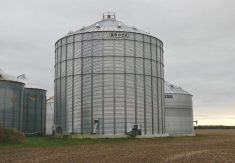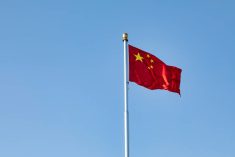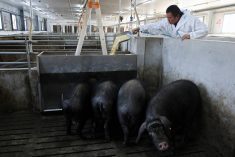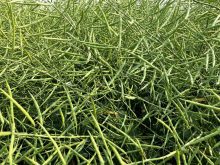Winnipeg | Reuters –– Canada and China are in talks about Beijing’s plans to toughen its standard on Canadian canola imports, an industry official said on Monday, just days before the change takes effect.
China’s quarantine authority, AQSIQ, notified the Canadian Food Inspection Agency (CFIA) last month that it would allow no more than one per cent of foreign material, such as straw and seeds from other plants, in canola shipments starting April 1. The current limit is 2.5 per cent.
Exporters have said the new standard by Canada’s biggest canola export market, arising from a dispute about a harmful fungus, would be difficult and costly to meet.
Read Also

U.S. grains: Soybeans continue gains on Trump’s China comments
Chicago | Reuters – Chicago Board of Trade soybeans continued a three-day rally on Friday, fuelled by President Donald Trump’s…
“There are active negotiations underway,” said Patti Miller, president of the Canola Council of Canada, an industry group whose directors include farmers as well as exporters and processors Cargill, Richardson International, Viterra, Bunge and Archer Daniels Midland.
“Both government and industry would like to have a permanent resolution. The focus of the negotiation is how we get there.”
Miller, speaking by email, said she could not comment on specifics. Ottawa is leading negotiations for Canada, with the council’s input, she said.
The Western Producer reported Thursday that China may delay implementation, citing Canadian industry sources.
CFIA spokeswoman Maria Kubacki confirmed the Canadian and Chinese governments are in talks, but said it was premature to comment on possible outcomes.
Blackleg disease, caused by a fungus common in Canada, can significantly reduce crop yields, and China has raised concerns since 2009 about the risk of it spreading to the country through imports. Some traders in both countries said the real issue behind the new standard was that China had ample stocks of rapeseed oil and wanted to slow imports.
A spokesman at the Chinese embassy in Ottawa could not comment.
ICE Canada canola futures lost eight per cent after China notified Canada of the pending change on Feb. 23. They bottomed out on March 2 and since have recovered the losses. They climbed 0.8 per cent on Monday.
— Rod Nickel is a Reuters correspondent covering the agriculture and mining sectors from Winnipeg.















